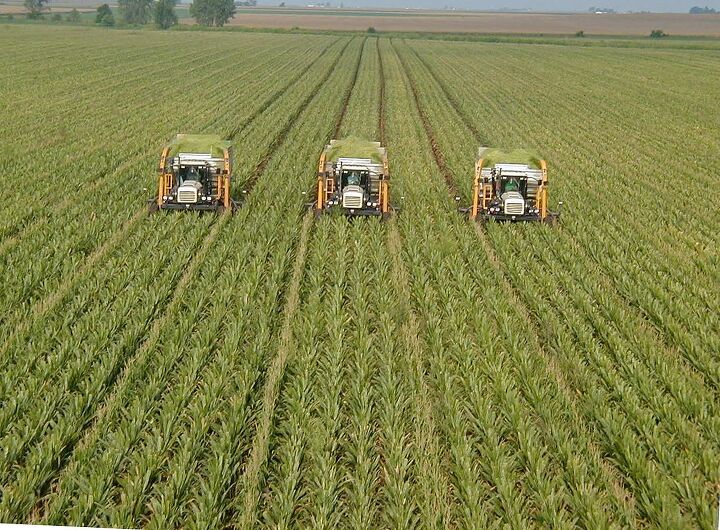Meanwhile, Back At The Farm: Ford Promises Flex-Fuel Bumper Crop

As TTAC readers well know: There is a huge E85 flex-fuel loophole in the new federal fuel economy CAFE standards. Ford will drive right through that barn door-sized hole.
By the end of this year, Ford wants to deliver 370,000 flex fuel vehicles, a number which they can trade against fuel oinkers. Let’s review: A flex-fuel vehicle is one that is capable of running on E-85. But it doesn’t have to. It can also run on straight gas. Or on any mixture of the two fuels. As long as it’s E85 capable, it counts at least for a Peppermint White Chocolate Mocha at the DC CAFE.
At the 2010 BIO International Convention in Chicago, Sue Cischke, Ford’s group vice president, Sustainability, Environment and Safety Engineering said that “Ethanol and other biofuels help reduce the county’s dependence on imported oil.”
She even had stats to prove it: More ethanol is now produced and used in the U.S. than the amount of gasoline made from oil imported to the U.S. from Saudi Arabia and Iraq combined. Now there’s food for thought …
Ford is ready to expand flexible-fuel vehicle output to 50 percent of total 2012 model year vehicle production. Under one condition, says Ford:
“Assuming incentives continue to encourage the manufacturing, distribution and availability of renewable fuels as well as the production of flexible fuel vehicles.”
So CAFE credits aren’t incentive enough?

Bertel Schmitt comes back to journalism after taking a 35 year break in advertising and marketing. He ran and owned advertising agencies in Duesseldorf, Germany, and New York City. Volkswagen A.G. was Bertel's most important corporate account. Schmitt's advertising and marketing career touched many corners of the industry with a special focus on automotive products and services. Since 2004, he lives in Japan and China with his wife <a href="http://www.tomokoandbertel.com"> Tomoko </a>. Bertel Schmitt is a founding board member of the <a href="http://www.offshoresuperseries.com"> Offshore Super Series </a>, an American offshore powerboat racing organization. He is co-owner of the racing team Typhoon.
More by Bertel Schmitt


































Comments
Join the conversation
>>>She even had stats to prove it: More ethanol is now produced and used in the U.S. than the amount of gasoline made from oil imported to the U.S. from Saudi Arabia and Iraq combined. Now there’s food for thought … The big question: how much oil went into the production of that ethanol? In the US, agriculture causes more greenhouse gas emissions than automobiles.
"The big question: how much oil went into the production of that ethanol? In the US, agriculture causes more greenhouse gas emissions than automobiles." Oh, oh, pick me pick me, I know! Very very little *oil* went into producing the ethanol. On a lifecycle analysis, only about 1/3 of the energy used to make corn ethanol is associated with any aspect of crop production, and of that, only a small fraction is from petroleum (gas, diesel) - much of it is in the form of natural gas used to make nitrogen fertilizers, etc. Most (2/3) of the energy used to make ethanol is consumed by the ethanol plant itself, and almost all of that is natural gas or coal, not petroleum. So, even though the total "energy balance" of ethanol is not great (about 1.4 BTU out per BTU in), the "petroleum replacement value" is awesome - about 7 BTU worth of gasoline replacement for every BTU of petroleum put in. So, ethanol is really about converting abundant, domestic sources of energy (coal, natural gas) into a replacement for a more scarce, largely imported source of energy (oil). It is really not that fundamentally different from the process of converting coal (abundant but useless to most people) into electricity. A major difference though is that ethanol also offers a (modestly) positive energy balance because of the capture of solar energy by the crop. In the coal-to-electricity conversion you lose about 2/3 of the energy you started with.
Subsidizing 'Corn Ethanol' is bad. Converting waste biomass to Ethanol is good (why just bury garbage). 'Normal' engines being less fuel efficient on Ethanol is bad. Small turbocharged engines can be as efficient on Ethanol as gas (think ecoboost) is good.
Mr. Schmitt: +1 for not taking the obligatory (and ill-informed) cheap shots at ethanol that this site has jumped on in the past. -1 for showing a pic of a SWEET corn (or possibly seed corn) harvest with the post, they're not gonna be making much E85 out of that.